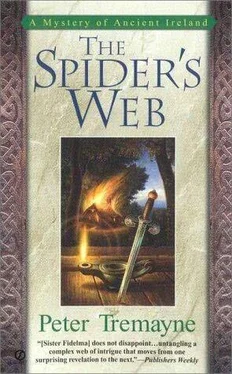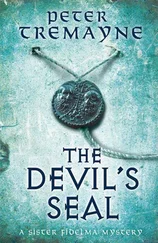Peter Tremayne - The Spider's Web
Здесь есть возможность читать онлайн «Peter Tremayne - The Spider's Web» весь текст электронной книги совершенно бесплатно (целиком полную версию без сокращений). В некоторых случаях можно слушать аудио, скачать через торрент в формате fb2 и присутствует краткое содержание. Жанр: Исторический детектив, на английском языке. Описание произведения, (предисловие) а так же отзывы посетителей доступны на портале библиотеки ЛибКат.
- Название:The Spider's Web
- Автор:
- Жанр:
- Год:неизвестен
- ISBN:нет данных
- Рейтинг книги:5 / 5. Голосов: 1
-
Избранное:Добавить в избранное
- Отзывы:
-
Ваша оценка:
- 100
- 1
- 2
- 3
- 4
- 5
The Spider's Web: краткое содержание, описание и аннотация
Предлагаем к чтению аннотацию, описание, краткое содержание или предисловие (зависит от того, что написал сам автор книги «The Spider's Web»). Если вы не нашли необходимую информацию о книге — напишите в комментариях, мы постараемся отыскать её.
The Spider's Web — читать онлайн бесплатно полную книгу (весь текст) целиком
Ниже представлен текст книги, разбитый по страницам. Система сохранения места последней прочитанной страницы, позволяет с удобством читать онлайн бесплатно книгу «The Spider's Web», без необходимости каждый раз заново искать на чём Вы остановились. Поставьте закладку, и сможете в любой момент перейти на страницу, на которой закончили чтение.
Интервал:
Закладка:
‘But having said as much, I feel that you should explain yourself.’
‘I really don’t know the substance except that Teafa was angry, shouting at Cranat, and Cranat was in tears.’
‘You must have heard something then. You must have gained some idea as to the cause of the quarrel?’
‘Not I. I recall that Móen was mentioned and also Eber. Teafa was shouting something about divorce.’
‘She was demanding that Cranat divorce her brother?’
‘Perhaps. I do not know. Cranat ran off to the chapel to seek solace from Father Gormán.’
Fidelma made no other comment but stood looking around the bed chamber, examining it minutely before returning to the dividing door and examining the reception room.
‘For someone who is deaf, dumb and blind, this Móen would appear to have the gift of moving easily through this rath.’
Eadulf came to join her with a frown.
‘What do you mean, Fidelma?’ he asked.
‘Regard these rooms, Eadulf. Firstly, Móen had to make his way here. Then he had to enter, negotiate his way to Eber’s bed chamber and enter, take his knife, find his target and kill Eber before the chieftain realised his presence. That not only takesstealth but a talent I would not expect to find in one who is so debilitated.’
Dubán overheard and appeared disapproving.
‘Are you denying the facts?’ he demanded.
Fidelma glanced at him.
‘I am merely trying to ascertain them.’
‘Well, the facts are simple. Móen was found in the act of slaughter.’
‘Not quite,’ Fidelma corrected. ‘He was found by Eber’s body. He was not actually seen killing him.’
Dubán put his head back and gave a gruff bark of laughter.
‘Truly, sister, is this the logic of a Brehon? If I find a sheep with its throat ripped out and sitting by the carcass is a wolf with blood on its muzzle, is it not logical that I should blame the wolf for the deed?’
‘It is reasonable,’ Fidelma conceded. ‘But it is not proof positive that the wolf did it.’
Duban shook his head in disbelief.
‘Are you trying to claim …?’
‘I am trying to discover the truth,’ snapped Fidelma. ‘That is my sole purpose.’
‘Well, if it is truth you want, then it is well known in the rath that Móen was able to move about without undue difficulty within certain areas.’
‘How was this accomplished?’ Eadulf was intrigued.
‘I presume that he had some sort of memory. He also seemed to smell his way.’
‘Smell?’ Eadulf’s tone was disbelieving.
‘You saw the way he used his sense of smell in the stable to identify that there were strangers there. He has developed his sense of smell like an animal. Provided he is placed in certain areas of the rath he can find his way within those areas. Everyone knows that.’
‘Ah, so it is of no surprise that he was able to negotiate his way here?’
‘None whatever.’
Eadulf looked at Fidelma and shrugged.
‘Well, it seems there is no mystery then.’
Fidelma did not reply. She was not convinced.
‘Where is the knife with which Móen stabbed Eber?’
‘I have it still.’
‘Has the knife been identified?’
‘Identified?’
Dubán sounded puzzled.
Fidelma was patient.
‘Has the ownership of the knife been discovered?’
Dubán shrugged.
‘I believe it is one of Eber’s own hunting knives.’ He pointed to one of the walls where a collection of swords and knives hung with a shield. One hanging sheath was clearly empty. ‘I saw that one of the knives was missing and I presume that it was the one which Móen took.’
Fidelma moved to examine the place which Dubán indicated. She turned and walked across the room to the main door. Then she stood with her back to it for a moment before making her way around the intervening pieces of furniture towards the knife rack. It was a complicated and indirect route because of the intervening obstacles. Finally, she reached out to the rack, then turned and made her way around a table and bench to the bed chamber door.
She paused and stood looking thoughtful for a moment.
‘I will want to see that weapon shortly.’
Dubán inclined his head.
‘Good. And now let us see where Teafa was discovered and in what manner.’
Chapter Seven
Dubán escorted them out of Eber’s apartments and along the path behind the stables. The track twisted and turned beyond some store houses which stood next to a kiln for drying corn. They crossed a yard, with a well in it, towards a small wicker and wattle covered cabin.
‘Teafa had her own cabin,’ he explained as they walked, ‘away from the rest of the chieftain’s family.’
‘Did you say that she was never married?’ asked Eadulf.
‘I did,’ Dubán replied. ‘Why do you ask?’
Eadulf smiled knowingly.
‘It is surely unusual for the unmarried sister of a chieftain to live outside of the chieftain’s immediate circle of apartments?’
‘She still dwelt within the chieftain’s rath ,’ explained Dubán, clearly unsure of the point Eadulf was making.
In the land of the South Folk, women were regarded as the property of the male head of the household until they married and only then would they be allowed outside of the confines of the house of the family. Eadulf suddenly realised that his view was not valid in the five kingdoms.
‘What Brother Eadulf means,’ interposed Fidelma, ‘is that Teafa’s cabin is a poor one on the outskirts of the rath when she might have been expected to dwell in more luxury within the interior of the chieftain’s apartment.’
Dubán grimaced indifferently.
‘It was her own preference. I recall that she made that decision just after she had adopted Móen.’
Teafa’s cabin appeared to be only a small construction but onceinside, Fidelma noticed that it was divided into three rooms. A large room in which Teafa and her charge had obviously cooked, eaten and used as a general living area. In most houses of this size it was called a tech immácallamae or ‘house of conversation’, a common gathering point for a family and their friends. Two doors gave access to bed chambers. It was obvious which room Móen had occupied for it had no window and the light from the open door revealed a simple mattress on the floor with no furniture.
Fidelma was about to turn back when something caught her eye behind the door of Móen’s bed chamber.
‘Is there a candle or lamp in here?’ she asked.
Dubán took up a flint and tinder from a side table and soon had a tall tallow candle spluttering.
Taking the candle, Fidelma entered the room which Móen had occupied, and turned to the area behind the door. To the untrained eye it seemed that there was a stack of firewood piled high there, bundle after bundle, bound with leather thongs.
‘Come here, Eadulf,’ Fidelma instructed. ‘What do you make of this?’
Eadulf moved forward. Dubán followed, peering over his shoulder, and saw the bundles of sticks.
‘An odd place to keep kindle for the fire,’ Dubán observed.
Eadulf had reached forward and picked up a bundle. The sticks were cut to uniform lengths of about eighteen inches. They were mainly of hazel and some were of yew. Eadulf was examining them closely and, at one point, he unbound a bundle to examine the lengths of stick. Finally he turned to Fidelma. He smiled knowingly.
‘It is not often you see such fine specimens outside of the great libraries.’
Dubán looked bewildered.
‘What does he mean, sister?’
Fidelma regarded Eadulf with the approval that a teacher reserves for a bright pupil.
‘He means that these pieces of kindle, as you call them, are in fact what are known as “Rods of the Poets”. They are old books. Look closely. You will see that they are notched in the ancient Ogam alphabet.’
Читать дальшеИнтервал:
Закладка:
Похожие книги на «The Spider's Web»
Представляем Вашему вниманию похожие книги на «The Spider's Web» списком для выбора. Мы отобрали схожую по названию и смыслу литературу в надежде предоставить читателям больше вариантов отыскать новые, интересные, ещё непрочитанные произведения.
Обсуждение, отзывы о книге «The Spider's Web» и просто собственные мнения читателей. Оставьте ваши комментарии, напишите, что Вы думаете о произведении, его смысле или главных героях. Укажите что конкретно понравилось, а что нет, и почему Вы так считаете.











